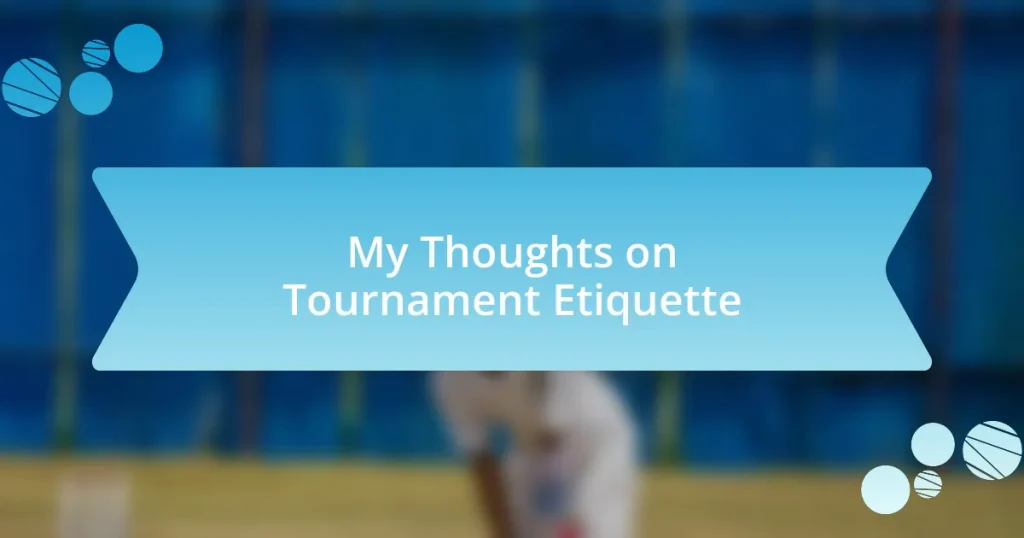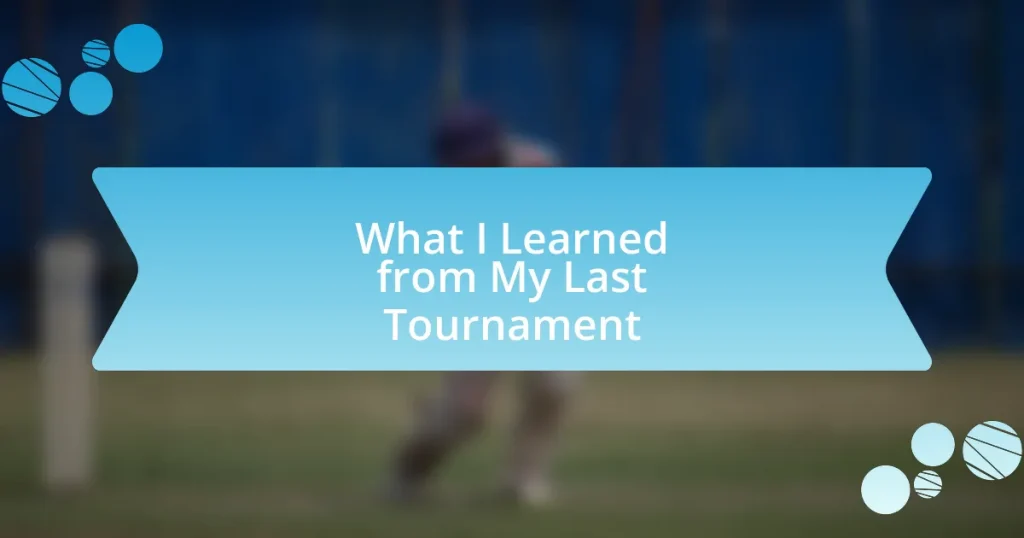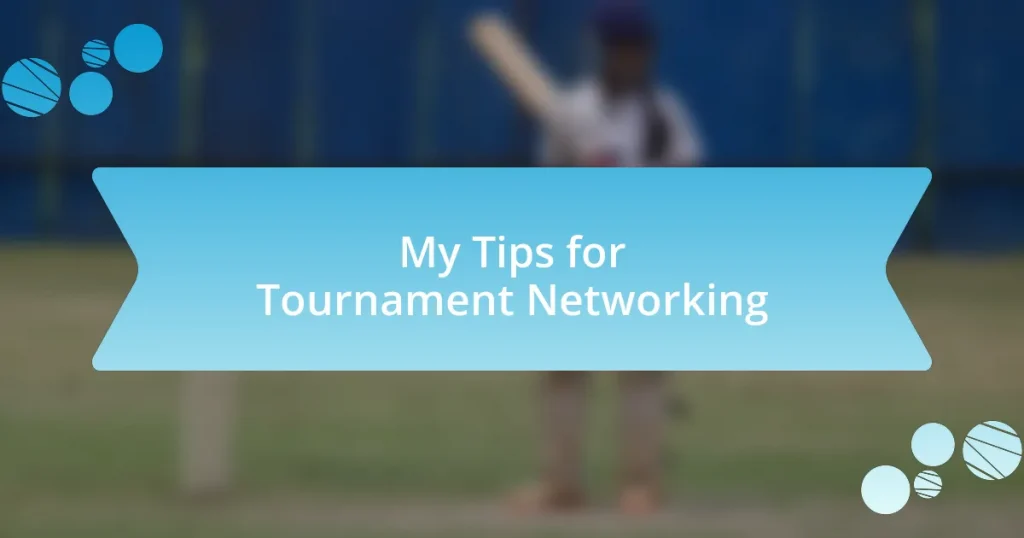Key takeaways:
- Acknowledge opponents through simple gestures like handshakes and applause to foster respect and camaraderie.
- Demonstrate good sportsmanship by supporting teammates and congratulating opponents, creating a positive environment.
- Communicate respectfully with officials and choose the right timing for discussions to maintain smooth interactions.
- Embrace rules and regulations to ensure a fair and enjoyable experience for all competitors.
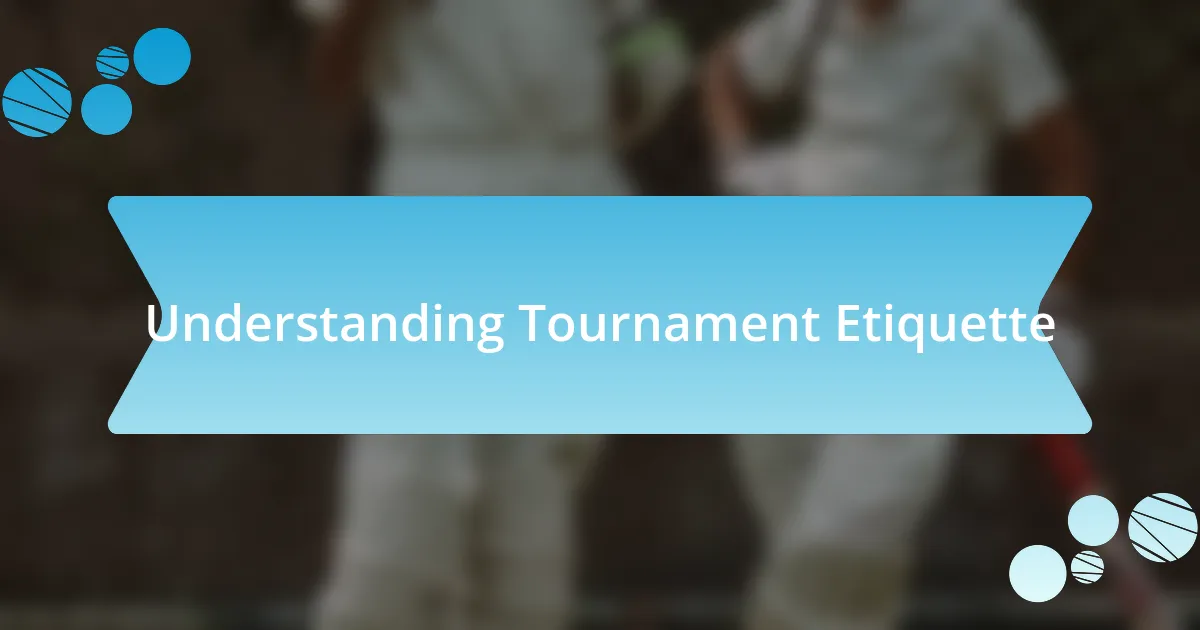
Understanding Tournament Etiquette
Understanding tournament etiquette is crucial for creating a respectful and enjoyable environment for everyone involved. I still remember my first tournament; I overlooked the significance of acknowledging my opponents before and after matches. What a difference it made when I started doing this! Have you ever thought about how a simple handshake or a kind word can shift the mood?
It’s not just about following rules but about fostering camaraderie among competitors. I’ve seen players lose their temper after a tough call, and it truly dampens the spirit of the game. In those moments, I ask myself, how can we promote sportsmanship when tensions run high? Acknowledging that everyone is there to compete but also to have fun can help maintain a positive atmosphere.
Moreover, being respectful of officials is a key component of tournament etiquette. I recall a situation where a player aggressively questioned a referee’s decision. It made the entire audience uncomfortable and, frankly, overshadowed the event. How can we expect fairness when we don’t treat the people enforcing the rules with respect? Demonstrating patience and understanding not only elevates the competition but enhances the experience for all involved.
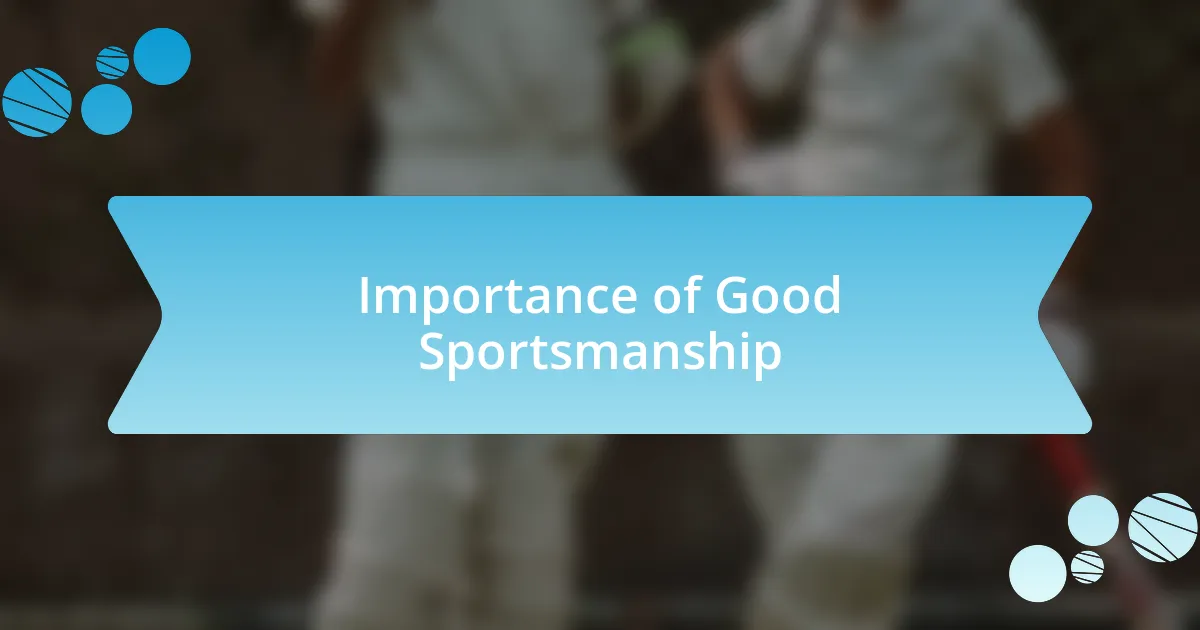
Importance of Good Sportsmanship
Good sportsmanship is a foundational element in any competitive event. I recall a tournament where a last-minute loss left me feeling crushed. Instead of sulking, I decided to congratulate my opponent on their hard-fought victory. The mutual respect exchanged in that moment shifted my perspective. It wasn’t just about winning or losing, but about recognizing the effort put forth by everyone involved. Have you ever let a moment of grace lift your spirits?
During my sports experiences, I’ve learned that good sportsmanship encourages an environment where players feel supported rather than isolated. I remember a game where one of my teammates made a mistake that led to a score for the opposing team. Instead of tearing him down, we rallied around him with encouraging words. That support not only boosted his confidence but also strengthened our team dynamic. Isn’t it fascinating how positivity can transform our interactions?
Additionally, maintaining good sportsmanship sets a powerful example for younger players observing the behavior of more experienced ones. I’ve seen it firsthand when younger athletes emulate the attitudes they see on the field. They learn that competition can exist alongside kindness and respect. Wouldn’t it be great if every generation carried that understanding into their sports?
| Good Sportsmanship | Negative Sportsmanship |
|---|---|
| Encourages camaraderie | Creates tension and hostility |
| Builds respect amongst players | Fosters resentment |
| Promotes a positive environment | Leads to negative experiences |
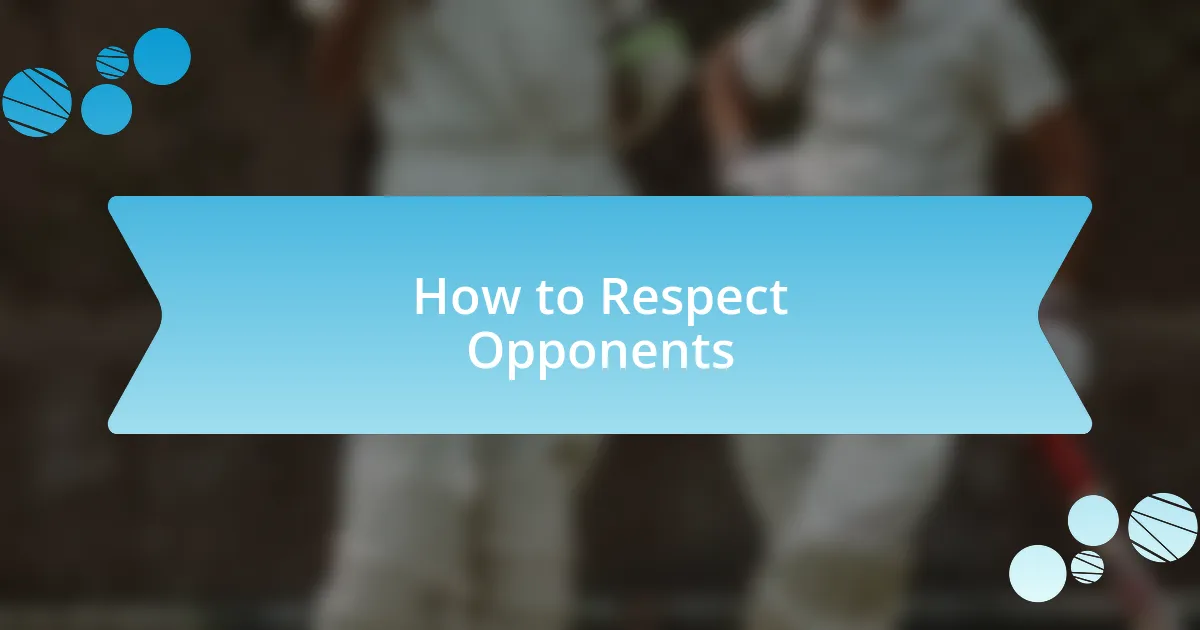
How to Respect Opponents
Respecting opponents is crucial in fostering a competitive yet friendly atmosphere. I vividly remember a match where the opposing team made some questionable calls. Instead of arguing or displaying frustration, I chose to express my concerns politely. This approach not only maintained the integrity of the game but also defused the tension. It reminded me that valuing our opponents’ dignity can change the entire experience for everyone involved.
Here are some practical ways to show respect during tournaments:
- Acknowledge good plays: A simple nod or applause can go a long way in recognizing your opponent’s skill.
- Avoid trash talk: Keep conversations friendly; joking can be taken the wrong way, so err on the side of caution.
- Be gracious in defeat: Congratulating the winner with sincerity reinforces respect, showing that you value their effort.
- Offer help when appropriate: If a competitor struggles, a word of encouragement can demonstrate sportsmanship and empathy.
- Follow the rules: Respect the game and its officials; this shows your opponents that you value fair play as much as they do.
Each of these actions can create a more positive atmosphere, allowing for better competition and camaraderie.
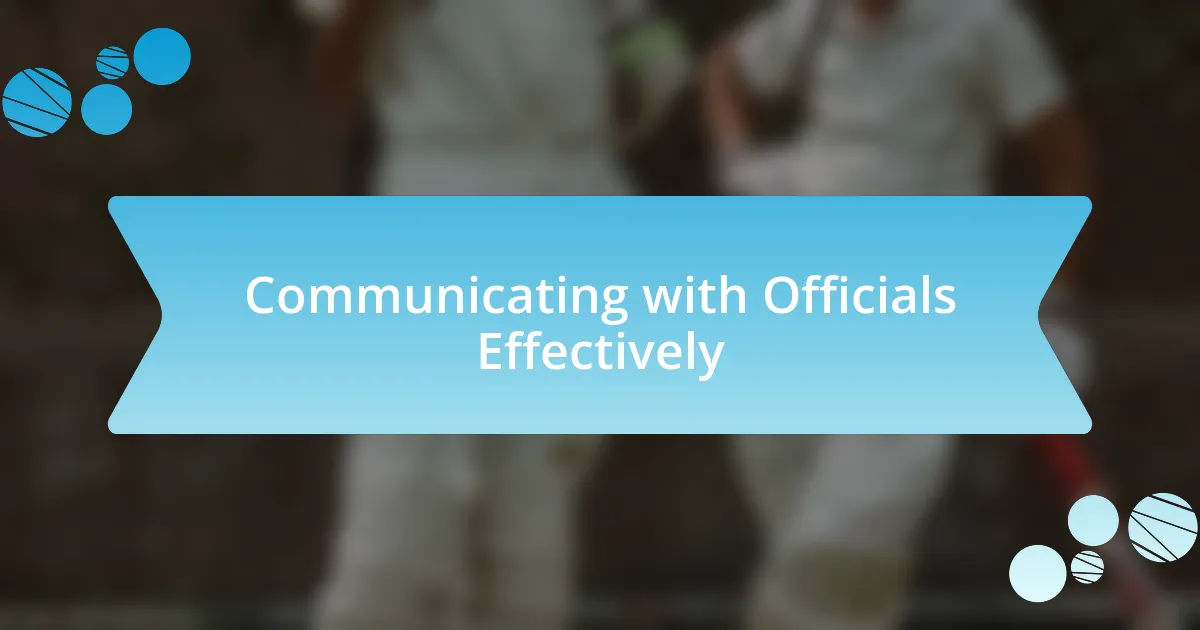
Communicating with Officials Effectively
Effective communication with officials is essential for a smooth tournament experience. I once found myself in a high-pressure match where a call went against my team. Rather than reacting impulsively, I took a deep breath and approached the official calmly. I asked for clarification on the decision, which opened a dialogue that helped me understand their perspective. This experience taught me that staying composed can turn a potentially negative interaction into a constructive conversation.
It’s important to utilize respectful language when addressing officials. In my experience, prefacing my questions with “Could you please explain…” rather than “Why did you…” makes a world of difference. This approach not only shows that you respect their authority but also that you’re genuinely seeking to understand their reasoning. This simple shift in wording can foster a more collaborative environment during tense moments.
Finally, timing matters in communication. There was a time when I chose to wait for a break in the action to speak with an official instead of interrupting gameplay. Waiting for the right moment allowed me to address my concerns without disrupting the flow of the tournament. I often wonder how many misunderstandings could be avoided if everyone considered the timing and approach of their communication. By cultivating this awareness, we can enhance our interactions with officials and contribute to a more respectful tournament environment.
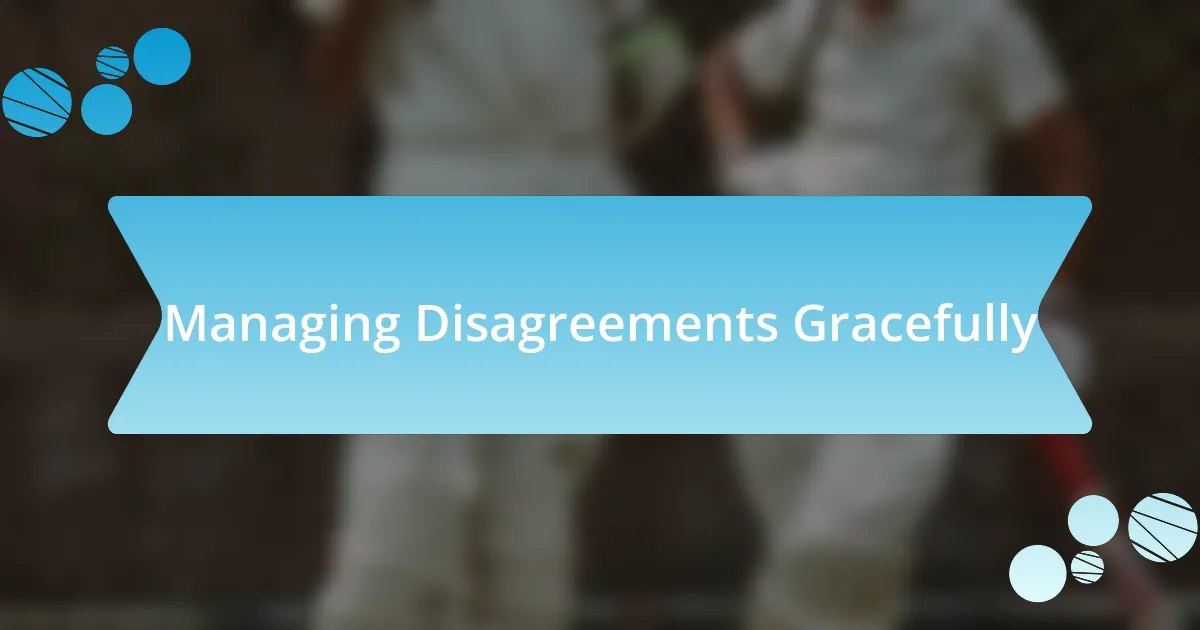
Managing Disagreements Gracefully
When disagreements arise, I have found that acknowledging the other person’s viewpoint is crucial. I once had a teammate who was convinced that a tactical decision was unfair. Rather than shutting down the conversation, I listened intently, reflecting on their feelings while maintaining my own stance. In that moment, I realized that validation doesn’t mean agreeing; it shows respect for their emotions, which can significantly defuse tension.
During a particularly heated match, I witnessed two players arguing over a controversial call. The atmosphere quickly turned hostile, and I felt a wave of anxiety wash over me. I stepped in, sharing my own experiences of similar frustrations and urging them to focus on the game instead. It struck me then how empathy can act as a bridge, transforming discord into mutual understanding. Isn’t it interesting how sharing our struggles can create connection rather than conflict?
One key lesson I’ve learned is to remain solution-oriented rather than dwelling on the disagreement itself. After an intense doubles match where my partner and I disagreed on our approach, instead of pointing fingers, I proposed we brainstorm ways to improve. This shift from blame to collaboration not only resolved our differences but also strengthened our partnership. Have you ever recognized how turning the focus toward resolution can change the entire dynamic of a disagreement?
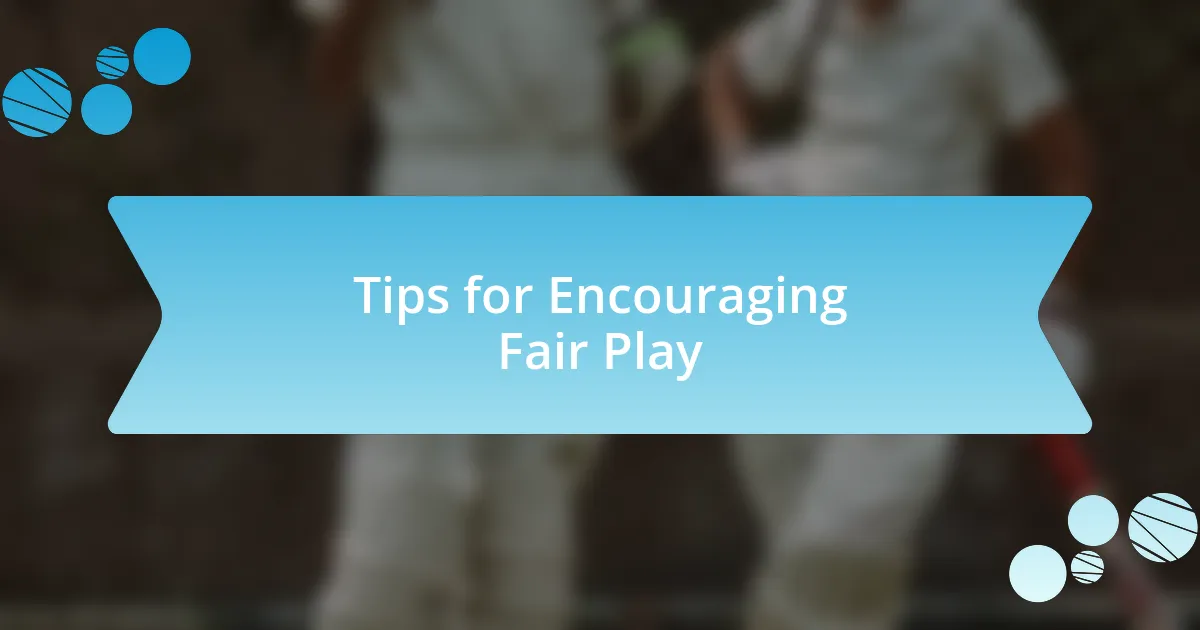
Tips for Encouraging Fair Play
Promoting fair play often starts with creating an inclusive environment. I recall a tournament where we intentionally recognized not only the winners but also the effort of every player. In that moment, I noticed how motivation soared because everyone felt valued. Isn’t it amazing how a little recognition can encourage players to respect one another on and off the field?
Communication is an essential element in encouraging fair play. During a friendly match, I took the time to discuss the rules with my teammates and openly share our expectations before we started. This transparency seemed to alleviate any potential misunderstandings. Have you ever noticed how much smoother things go when everyone is on the same page?
Another effective strategy I’ve found is leading by example. During a past event, I made a point to consistently shake hands and congratulate opponents, regardless of the match outcome. I saw how this simple act set a tone for others. It’s fascinating to consider how our behavior can ripple through a tournament, ultimately fostering a culture of respect and integrity.
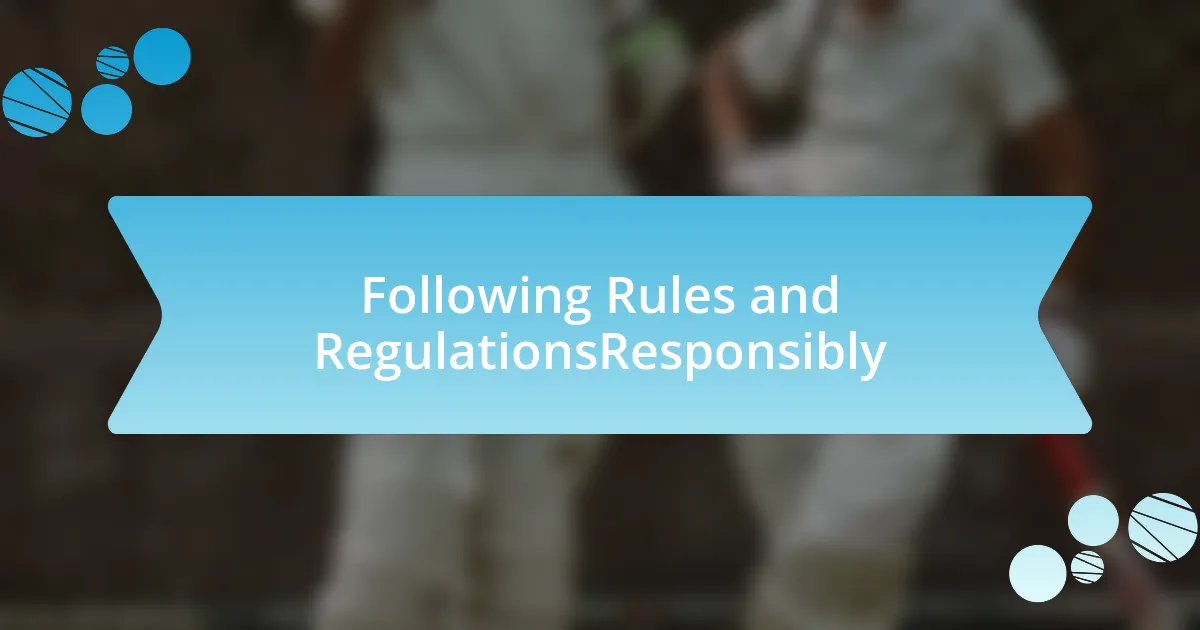
Following Rules and RegulationsResponsibly
Following rules and regulations is the backbone of any successful tournament. I remember participating in an event where the organizers emphasized rule adherence at the outset. This simple step not only created a level playing field but also helped me understand the importance of accountability in maintaining the spirit of competition. Isn’t it remarkable how clarity in rules can enhance the overall experience for everyone involved?
When I think back to a specific tournament, there was a moment when a player violated a key regulation, and I witnessed how it affected the game. Instead of letting emotions take over, the players and officials addressed the situation calmly and respectfully. I realized then that responsibly following the rules isn’t just about compliance; it’s about fostering an atmosphere where everyone can enjoy the game without undue stress. How often do we forget that our actions can shape the environment around us?
Embracing rules becomes particularly critical when conflicts arise. In one instance, I found myself in a heated debate over a call made by the referee. Instead of arguing, I chose to accept the decision and respectfully moved on. This experience reinforced my belief in the value of supporting officials and respecting their authority, paving the way for a more positive experience for all. Doesn’t it feel better when we focus on the game rather than dwelling on disputes?










